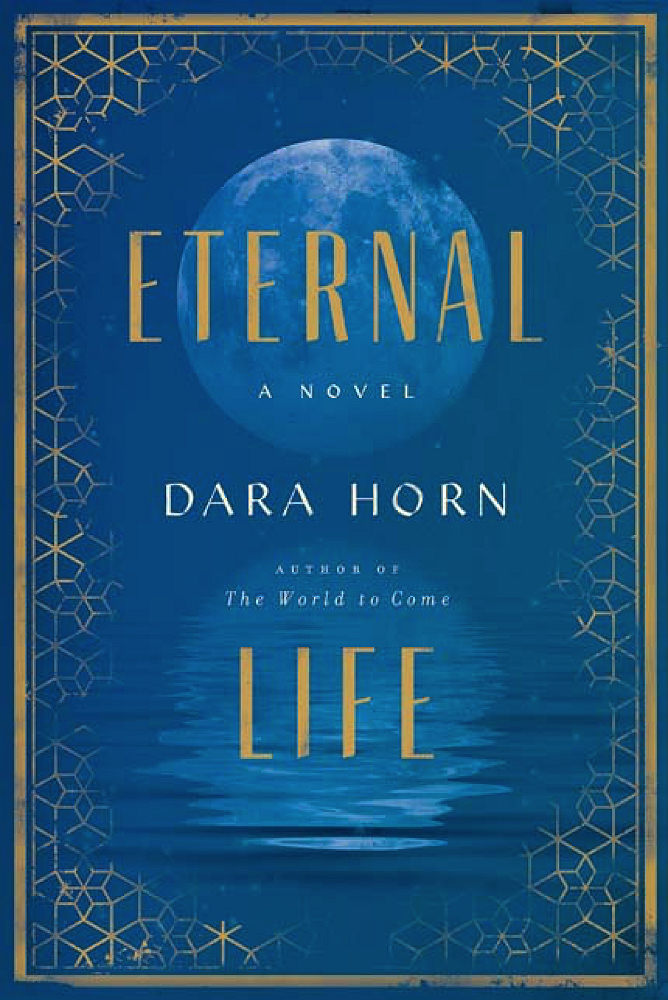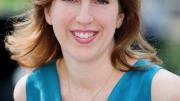Dara Horn ’99, Ph.D. ’06, would never choose to be immortal. In her new novel, Eternal Life, this is the problem facing Rachel, a 2,000-year-old Jewish woman who made a bargain with the high priest at the Second Holy Temple: in exchange for the survival of her sick son, she gives up her own death. “What reasons are there for being alive?” Rachel asks herself over the centuries. None of them—to love God; to serve others; to feel joy, to build for the future—has any meaning without the constraints of a normal human lifespan. As she watches her dozens of husbands and children die before she does, her relationship with God comes to feel “sadomasochistic.”

Eternal Life might be the most fantastical of Horn’s books, but it also emerges most directly from her daily life. “Something I’ve noticed was that friends of mine with smaller families become very nostalgic as their children grow up and pass milestones,” she says. “This is not at all my experience. I’m a mother of four young children, and when you have that many children, you keep going to preschool graduations over and over again. You just keep resetting the clock: ‘Oh, it’s the first day of kindergarten again!’”
Immortality is not a particularly original subject in literature, but stories of eternal life, she says, “are almost never about fertile women.” In her novel, Hannah, a gifted biologist who is researching life extension, discovers that her grandmother Rachel has the telomeres of a teenager. While reading about advances in anti-aging for the book, Horn, who spent her childhood in suburban New Jersey and is now raising her family there, thought back to her own, repetitive domestic experience: “Who in their right mind would want to go through this again and again and again?”
With Rachel’s life spanning Jewish societies—continually dying yet reborn after each disaster—from the Roman Empire to modern Israel, Eternal Life reads as a metaphor for Jewish history. The novel also reflects the contrast between the Judaic and American relationships to time, says Horn. “In the United States we have this mythology that your past doesn’t matter—that’s the premise of the American experiment. The premise of Judaism is exactly the opposite, because the founding mythology of Judaism is that when God gave the Torah to the Israelites at Mount Sinai, it wasn’t just that generation of Israelites that was present, but all their future descendants were present. The most important thing in your life happened thousands of years before you were born.”
Horn moonlights as a professor of Jewish literature (she has held the Weinstock visiting professorship in Jewish studies at Harvard), and her novels, five in all, have been recognized for their engagement with the texts she has worked on academically, often colliding in funny ways with her modern characters. “The great thing about getting a doctorate was that no one expects you to finish it!” she says. “Every time I would get stuck on my dissertation I would procrastinate by writing my novel, and vice versa, so I never felt like I was doing any work.”
Growing up, she sensed what she describes as a thinness to American Jewish literature. “In the 1980s and ’90s, when you told someone you were interested in Jewish literature, they’d hand you a book by Philip Roth. This whole generation of Jewish writers from the last century were really writing more about the first-generation American experience, the experience of Judaism as a social identity. And I was like, ‘This is so not what I’m looking for.’” Those authors dwelled on questions about assimilation and authenticity; Horn was uninterested in that conversation (which she calls “annoying”). Since her college and doctoral work, she has come to link this thinness to the disappearance of Hebrew and Yiddish context from contemporary American Jewish writing. “When you’re reading modern Hebrew, there are references to ancient Hebrew embedded in the work—you can’t avoid it. So many figuresof speech are linked to ancient sources and the commentaries on them.”
Horn didn’t start writing fiction until the year after college, while on a miserably lonely postgraduate fellowship at the University of Cambridge (“England just wasn’t my scene,” she says, laughing). She had always been terrified of the genre, until the realization that “books don’t come out of nothing”—that they’re in conversation with other books—gave her the confidence to make up stories of her own, to fill the gaps in modern Jewish literature.
“When I first started writing my novels, part of my motivation—in the way that you’re massively ambitious when you’re younger and then realize, ‘Oh, that was dumb’—was to ‘fix’ this problem,” she says. “I thought, wouldn’t it be cool if we could have this in English? Contemporary stories that bring alive these ancient texts?” And so Horn’s 2006 novel The World to Come, written while she was avoiding her doctoral work, weaves the life and stories of the Soviet Yiddish writer Der Nister into the present day. Unlike a Jonathan Safran Foer or a Michael Chabon, she fills the void of “Jewish identity” with a deep knowledge of Jewish sources.
Horn’s interest in engaging imaginatively with Jewish texts extends to her personal religious practice. “We have a Passover Seder that’s extremely epic, where we put up a pyramid in the living room, I wear a pharaoh costume and my husband wears a Moses costume, we have ‘plague drops’ where stuff falls out of the ceiling, we have a ‘hail cannon’ that fires Ping-Pong balls into the room, and we have a drone strike for the last plague,” she enthuses. “What’s important to us,” she emphasizes, “is less about the ritual aspects, or that you have to believe x, y, and z. What’s important to my family is being invested and creatively engaged with this tradition, which is of a piece with what I’m doing in my books.”
She aims to make the Jewish tradition welcoming not just to a Jewish audience, but to a broader readership. “Is everyone going to understand every reference in there? No, but that’s not a problem. When I’m reading Salman Rushdie, I’m not sitting here waiting for an explanation of why some character is covering her hair. I don’t want to read a book with footnotes—I want to be welcomed into a world.”








